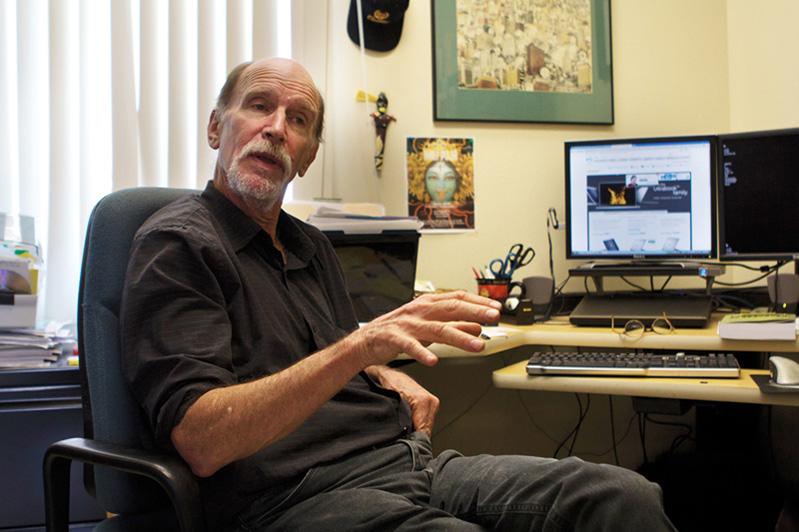
Sergio Robles / The Collegian
Fresno State psychology instructor Bob Levine is impressed that the small Asian province of Bhutan, about twice the size of Fresno County, a country that is so behind modern times that streets don’t even have traffic lights, can embrace the advanced notion of happiness as a product.
It is a country that believes happiness can be measured and studied in a way that the emotions of the people can change national policy. It is run by a government empathetic to its citizens, and changes itself to provide that happiness for them.
It is a body of power that is molded and shaped by the moods of its people, and it’s the only country in the world that does it.
For generations, Bhutan has been an isolated country nestled between India and Tibet, its northern border comprised of the Himalayan mountain range. The country’s elevation rises from around 600 feet at the southern end to more than 23,000 feet up north.
The first time its citizens experienced the glow of television was in 1999.
Over a year ago Levine visited Bhutan to be inducted into its Gross National Happiness project.
He had been in contact for some time with the director of the Center for Bhutanese Studies, Dasho Karma Ura.
Now, he’s going back, this time in order to be more involved. His work this time may lead to change national policy.
“The country is going through this natural experiment which to me, as a social psychologist, to be able to observe how people change, how social dynamics change””it’s all before our eyes,” Levine said. “And that’s what interests me about it.”
The project is tentatively scheduled to begin in January 2013.
The government is moving forward with a new phase to the project, Levine said. The plan that he helps to develop will aid in the economic and spiritual growth of the country’s happiness.
“It’s really wonderful to me,” Levine said. “How effective they’re going to be is an open question.
“Traditionally, when countries grow, the question of psychological quality of life gets left behind. But what I’m so impressed with is the notion that the leaders of a country, as national policy, are emphasizing the importance of psychological, emotional, social, physical well-being of their people.”
The country’s fourth Dragon King, Jigme Singye Wangchuck, founded Bhutan’s Gross National Happiness index in 1972 in an effort to begin modernization of the country.
“The king, of all people, this monarch, comes up with the notion of the quality of life, and that making money does not equal a better quality of life,” Levine said. “He developed this notion, as well as measurement of gross national product to measure gross national happiness.”
Levine received two letters of invitation, one from former Bhutanese King Jigme Singye Wangchuck, who abdicated his throne to his son in 2006, and another from Jigmi Y. Thinley, prime minister of Bhutan.
Levine will join around 35 other scholars in an International Expert Working Group, to aid the Gross National Happiness project in conjunction with the United Nations.
His contribution to the group is to help the government understand the correlation of happiness and the perception of time.
Levine, who has taught psychology at Fresno State since 1974, is an internationally known instructor and lecturer. Time is a field of psychology that Levine has devoted many years of his educational life to, and is the focus of his first book, “The Geography of Time,” released in 1997.
“I know that my main responsibilities will be on that one dimension””that single dimension””of the gross national happiness index, which is time, both the subjective feelings about time and objective measures of time use,” Levine said.
Levine said the Bhutanese government will hire people to go from door to door with a packet of questions to gather the necessary information.
The government has experienced a lot of success with the method. The last round of data collected, came from around “tens of thousands of people,” out of a population of around 708,000, Levine said.
“In the United States, when national surveys are done, it’s around 1,500 to 2,000 people that are surveyed to represent the 300 million people in the United States,” he said. “So they’re very good at getting that data.”
Levine said he will use the information from the surveys to “get a sense of the way people are using their time, their sense of satisfaction with the way they’re using their time and looking at individual differences and maybe being able to find connections that’ll help in being more efficient””at the same time increasing that gross national happiness index.”
Levine said he would like to see Bhutan stand as an inspiration to other countries to put happiness on the agenda. Several countries, such as the United Kingdom, are already starting to experiment with the idea.
But the idea of happiness as a product of the country is still new, and in that sense, won’t be widely accepted, Levine said.
“Just try to imagine it,” Levine said. “Try to imagine a presidential candidate in the United States talking about gross national happiness. It would be the end of them.”
The assumption, Levine said, is that in the United States, there is a belief that happiness rises proportionally with that of income.
Levine believes, however, that countries don’t have anything to lose by opening up to the idea. After all, happiness can’t be bought or sold, he said.
“What I find most impressive about this project, is that a poor country, as part of (its) national policy, is emphasizing the importance of happiness,” he said. “I don’t see any downside to embracing that as a national value.”





